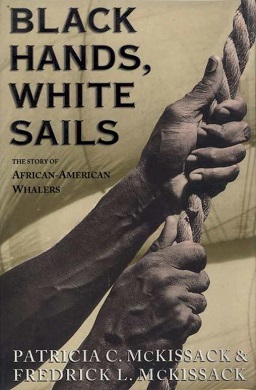Black Hands, White Sails facts for kids
 |
|
| Author | Patricia McKissack, Frederick McKissack |
|---|---|
| Country | USA |
| Language | English |
| Genre | Children's literature, US whaling history, African-American history |
| Published | 1999 (Scholastic) |
| Media type | Print (hardback, paperback) |
| Pages | 152 |
| ISBN | 9780590483131 |
| OCLC | 779095822 |
Black Hands, White Sails: The Story of African-American Whalers is an important book from 1999. It was written by Patricia McKissack and Frederick McKissack. This book tells the fascinating story of how African-Americans played a big role in the history of whaling in the United States. It explores their bravery and contributions to this challenging industry.
Contents
The Exciting World of Whaling History
Whaling was a very important industry in the United States, especially in the 18th and 19th centuries. Whalers hunted huge whales for their oil, which was used to light lamps and lubricate machines. Whalebone was also used for many things, like corsets and umbrellas. It was a dangerous but often profitable business.
Why African Americans Joined Whaling Crews
For many African Americans, whaling ships offered unique opportunities. Unlike jobs on land, which often had strict racial barriers, whaling ships were sometimes more open. Black sailors could find work and even advance to important positions. This was true for both free African Americans and those who had escaped slavery.
- Escape from Hardship: For some, joining a whaling crew was a way to escape slavery or racial discrimination on land.
- Opportunity for Skill: Whaling required great skill and courage. African Americans could prove their abilities and earn respect.
- Better Pay: Sometimes, the pay on whaling ships was better than what was available in other jobs.
- Leadership Roles: Many African Americans became skilled harpooners, boat steerers, and even captains. This was rare in other industries at the time.
Life Aboard a Whaling Ship
Life on a whaling ship was incredibly tough. Voyages could last for years, crossing vast oceans. Sailors faced storms, disease, and the constant danger of hunting massive whales.
- Hard Work: Every crew member had a job, from climbing the mast to spot whales to helping process the whale blubber.
- Danger: Hunting whales in small boats was extremely risky. Whales could overturn boats or smash them to pieces.
- Community: Despite the dangers, a strong sense of community often formed among the diverse crews. Sailors from different backgrounds worked together.
Awards and Recognition
Black Hands, White Sails has received several important awards. These awards recognize the book's quality and its contribution to children's literature and history.
- 1997-1999 NCTE Books For You: An Annotated Booklist for Senior High
- 2000 Carter G. Woodson Secondary Book Award - honor
- 2000 CCBC Choice
- 2000 Coretta Scott King Award author honor
- 2000 Society of Midland Authors Children's Nonfiction Award - winner
 | Dorothy Vaughan |
 | Charles Henry Turner |
 | Hildrus Poindexter |
 | Henry Cecil McBay |

